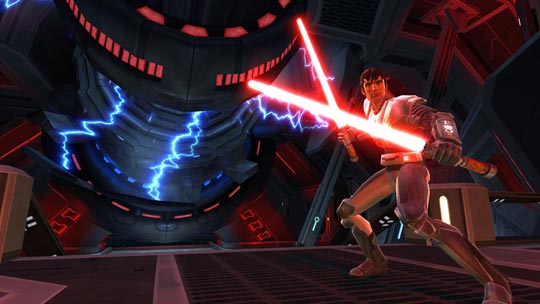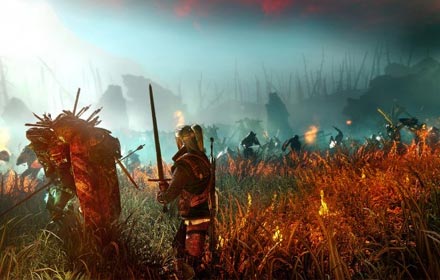The first thing I noticed about the front cover on my copy of Kingdoms of Amalur: Reckoning wasn't the decked out warrior wielding both a sword and a warhammer, but rather its bold pronouncement that it comes "From the minds of R.A. Salvatore, Todd McFarlane, and Ken Rolston." Yet, for all the namedropping that's been going on surrounding the game's release, Reckoning does little to prove these creatives deserving of their visionary status. That's not to belittle the exceptional work that they've all made in the past, but rather a way of pointing out the fact that Kingdoms of Amalur ultimately plays it too safe to show off the kind of ingenuity one might expect from this game-development supergroup. But while its adherence to role-playing traditions may cause it to lose the kind of shock-and-awe provided by recent groundbreaking RPGs like Skyrim or The Witcher 2, Reckoning falls into a comfort zone that any RPG fan can enjoy.
"Fate" is the most important key-word when it comes to describing Reckoning's story and overall design philosophy. To start with its narrative implications, the idea of predestination comes up often in the game's core narrative, as well as many of the major sidequests. The denizens of Amalur all have a fatalistic worldview, and subscribe to the notion that their path through life has been totally pre-determined. Yet the player character seems to be an exception, as he or she is brought back to life after being killed in battle to discover that they are fate-less. It's an interesting take on the usual "chosen one" trope that's been repeated so many times throughout RPGs, but the rest of the game's narrative simply doesn't back it up.

When it comes to any new role-playing IP, one of the first things many players scrutinize is the lore and world-building on display. While Big Huge Games certainly seems to have an astounding amount of lore (it's been said that they wrote about 10,000 years of history for Amalur), the level of quality in terms of its presentation doesn't nearly match the quantity. The game doesn't introduce players to its world in an accessible way, and unless you decide to dig through numerous extra dialog options or peer through texts lying around, it's hard to piece together a detailed understanding of exactly what this newfound fantasy realm is all about. The game's use of confusing, borderline-incoherent pieces of recorded dialog (dubbed Lorestones) in order to flesh out the game's millennia-spanning narrative doesn't help much either.
The minute-to-minute plot is a little more successful, though it still has its faults. The game tasks you with finding out your place in the world, all the while fighting off the deranged villain, Gadflow, and his army of equally deranged immortal beings. The main plot is pretty good since it makes more of an effort to bring the game's themes of predetermination and changing the fate of the world to the fore. The game's sidequests vary in terms of providing interesting narrative. At best, these side stories feel as worthwhile as the main plot; at worst they are merely throwaway context for a simple fetch mission.

As mentioned before, the idea of playing a character with no set path translates to gameplay as well. Reckoning allows for an unprecedented amount of openness when it comes to building your character. While you can train in the kinds of abilities and talents that will send you down the more traditional paths of the warrior, thief, or mage, you can easily hybridize any of these general cla.sses, or even make a jack of all trades. What's more, the game rarely puts equipment restrictions on you, and you can cheaply and easily reallocate your talent points whenever you may feel a change of heart. No RPGs have succeeded as well as Reckoning when it comes to circumventing restrictive character-building, and the level of freedom the game provides in terms of customization is one of its most shining qualities.
Another of Reckoning's greatest strengths is its visceral combat. The game takes more queues from hack-and-slash action games than traditional RPGs. As such, the controls are satisfying and responsive, and there's no shortage of moves, spells, counters, combos, and quick-time executions. Of course, your damage output and defenses are supplemented by behind-the-scenes stats and dice-rolls, making character progression feel even more meaningful. While even the simplest of combat encounters are a blast, great boss battles, and the occasional opportunity to pick off some enemies with stealth executions help shake things up a bit.
Reckoning also features the now-requisite dialog wheel, but conversing with the world's NPCs isn't nearly as engaging as it could have been. The writing and voice acting are perfectly good, but stiff character animations, terrible lip-synching, and the fact that half the screen is inexplicably blacked out all work towards making dialog something of a chore. The dialog options for the player character don't help either; your character isn't voiced, and rarely do you get to say anything that can shake up a conversation beyond a quick response from an NPC. Luckily, a few instances of meaningful decision making do pop up from time to time, and most choices result in tangible consequences.

The land of Amalur itself is something of an oddity as far as open world RPGs are concerned. Honestly, it's hard to compare the environment to any other game. While Reckoning certainly doesn't feature the sprawling vistas or the "go anywhere you can see" philosophy of games like Skyrim, it features a scope that more linear role-playing experiences like the Fable series simply don't offer. There are about two dozen different zones total, and unless you enter a major city or cross to a new continent, they are all seamlessly interconnected. While there are never any breathtaking expanses, there's plenty of room for exploration in each of these zones, and the locales never feel especially restrictive.
Reckoning's production values aren't very impressive, but they mostly get the job done. While conversations suffer from the aforementioned presentation problems, combat and cutscenes are animated very well (no doubt thanks to Todd McFarlane). The game's stylized art direction takes is undeniably inspired by the exaggerated visuals of games like Fable and World of Wacraft, but the world still feels relatively unique, and the art hides the fact that the graphics aren't all that impressive on a technical level. My one major gripe with the game's visuals is the camera, which focuses so much on the action taking place on the ground that you rarely get a sense of the game's often impressive scope and verticality. The game's sound department is similarly passable; the game's voice work and sound effects are good, but the music is uninspired and bland.

Reckoning delivers a lot of value for your dollar. Even if the story might not always keep you coming back, the prospect of leveling up and getting your hands on some new loot certainly will. If you set off to complete every side quest you come across, your play time could stretch well over the 60 hour mark. However, it's worth noting that the game's abundance of side quests are often quite bland and repetitive. Thusly, if you simply stick to the main storyline as well as the game's more inspired faction quest lines, you'll avoid the feeling that your playthrough is more a chore than anything else (not to mention that the game's running time will still be about 30-40 hours).
In recent years, big-budget RPGs have been pushing the genre to its very limits, offering grand worlds, game-changing decisions, and unique gameplay experiences. Kingdoms of Amalur: Reckoning is ultimately too derivative and too safe to reach the lofty heights of many of its peers, but the game does have its own small triumphs. The game's character progression is unprecedented in its openness, and allows for a truly freeing gameplay experience. Combat is also a blast thanks to the game's responsive controls and vast number of weapons, spells and special moves. Beyond these great mechanics, almost everything else in Reckoning, from the more minor facets of its gameplay to its presentation, are simply passable. Though the game is only notable in a few areas, there are also very few missteps (aside from the occasionally convoluted lore). Kingdoms of Amalur: Reckoning does absolutely nothing to shake up the role-playing genre, but a die-hard RPG fan will surely find it enjoyable.


























Log in to comment